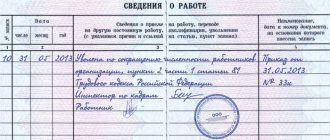Home / Labor Law / Dismissal and layoffs / Dismissal
Back
Published: 04/23/2016
Reading time: 8 min
0
8858
The dismissal of employees of the Ministry of Internal Affairs is regulated by the provisions of the Federal Law “On Police” (Article 40). Also, departure from service as a result of complete or partial loss of ability to work is provided for by the Labor Code (Article 83, paragraph five).
In general, dismissal is formalized according to general labor standards, but it also has its own characteristic features. For example, an employee has the right to receive special one-time benefits (Federal Law number 274, article 7) and compensation (Federal Law number 3, article 43, part five).
- What is the reason for dismissal?
- Dismissal procedure
- What payments are due?
- Is the job safe?
When dismissal is impossible
Current legislation, in particular Art. 35 of the Federal Law “On Service in the Department of Internal Affairs” regulates a number of situations when an employee cannot leave service on his own initiative. An employee will not be able to resign if during this period there is a martial law or a state of emergency, a counter-terrorism operation is being carried out or an armed conflict has arisen, or measures are being taken to eliminate the consequences of an emergency situation.
If an employee of the Ministry of Internal Affairs refuses to fulfill the obligations specified in the contract, he will be dismissed in accordance with paragraphs. 13th century 82.
Benefits for the military
There are separate benefits for employees of law enforcement agencies. During dismissal due to illness that is not a consequence of military duty, the employee receives:
- compensation for unused vacation;
- wages for the past month;
- payment based on length of service (if at the time of dismissal a military man served in the internal affairs department for more than 15 years, then he is paid seven salaries, and during service less than 15 years - 2 salaries);
- awards.
If the damage was caused due to official circumstances, and this is certified in the conclusion of the IHC, then in addition to the compensation described above, the victim may receive additional benefits. What payments are due upon dismissal due to health reasons:
- monthly benefits while receiving any disability group;
- one-time payment of 2 million rubles.
The benefit is maintained for one year from the date of dismissal and increases in the same way as the salary increase index.
In any case, during dismissal due to health, an employee of the Ministry of Internal Affairs is entitled to insurance subsidies. The life of a law enforcement officer is subject to state insurance at the expense of the budget of the region where he serves.
Military personnel who suffered harm to their health while performing their duties are entitled to additional benefits:
- children without a waiting list may be given a quota in a preschool institution at their place of registration;
- the right to employment in government agencies, provided that the position corresponds to the qualifications of the former employee;
- one-time benefits during dismissal from the internal affairs department for health reasons in the amount of 1.7 million rubles. upon receipt of the first disability group, 2 million rubles. — for the second group, 700 thousand rubles. - for the third disability group.
There are no separate benefits for workers who are injured while performing their job duties, or those dismissed due to general illness.
What payments are due?
Current legislation establishes that a full settlement must be made with a person. The organization is obliged to issue:
- wages, the amount of which will correspond to the time worked;
- bonuses for fulfilling one’s official obligations based on the results of a quarter or calendar year worked;
- severance pay if dismissal is due to deterioration in health.
Important! The amount of the benefit largely depends on the length of service of the police officer. If it is less than 10 years, then the benefit is equal to 5 monthly salaries, and if it exceeds 20 years, it increases to 20 salaries.
Vacation pay
Article 127 of the Labor Code of Russia regulates that upon termination of an employment contract, a person must be paid monetary compensation for all vacation days that he did not have time to use. The amount of compensation depends on the person’s average earnings.
Important! The police officer can submit a report on the provision of previously unused vacation days with aftercare. In such a situation, the contract terminates on the last day of rest.
Article 127 of the Labor Code of the Russian Federation “Exercising the right to leave upon dismissal of an employee”
Payment terms
Current legislation establishes that full payment must be made on the last working day, that is, at the time of issuance of all documents. If for some reason the police officer was unable to personally appear for the money, then the manager is obliged to send the appropriate notification about the need to receive it or express a request for it to be sent to a specific bank account or card.
Important! If the policeman decides to exercise his right to rest, then the payment must be made on the last working day, that is, just before the start of the vacation.
Sick leave payment
If the employee of the Ministry of Internal Affairs was not paid compensation for sick leave at the time of termination of the contract, then this must be done at the time of dismissal. Sick leave is calculated according to the standard plan, that is, including all sick days in the calculation. These funds must be transferred to the employee’s account no later than the day specified in the documents.
General provisions
Persons leaving the police for health reasons can receive benefits and additional payments from the budget of municipal organizations. The main requirements for state support are evidence of injury and harm to health received in the performance of official duties.
Labor legislation
Release from a position with compensation payments is determined by the rules of the law. But there are legal acts for regulation and features that operate at the legislative level:
- Law on Medical Examination (LMC).
- Federal Law “On Police”.
- Labor Code of the Russian Federation.
- Order of the Ministry of Internal Affairs No. 951.
- Department of Internal Affairs Order No. 774.
The dismissal of an employee from the Ministry of Internal Affairs for health reasons is regulated by legislation at the local level through local regulations. At the same time, the issues of what payments are due to a police officer upon dismissal due to illness are regulated.
Basic list of diseases
When illnesses are identified that prevent subsequent service in the Ministry of Internal Affairs, the employee can initiate dismissal, which can only be carried out with a written conclusion from the Military Commission, if it is impossible to switch to light work.
There is a certain list of diseases that imply varying levels of incapacity, as well as limited responsibility for service. But the main thing is to know only those articles that can lead to dismissal and absolute unfitness for service. These diseases include:
- HIV;
- respiratory diseases;
- cardiovascular pathologies;
- neuropsychic disorders;
- the presence of malignant neoplasms;
- progressive and persistent visual impairment;
- bone tissue defects that appeared as a result of injury;
- deafness;
- diseases of the genitourinary system;
- tuberculosis at any stage of development;
- STD.
A separate article should include injuries received during operations, as well as diseases that resulted from these injuries.
For these injuries, in addition to basic compensation, the dismissed employee may additionally receive compensation from the Russian government.
The degree of suitability for diagnosing diseases will depend on their manifestations.
If the symptoms are of moderate or mild severity, then the military medical commission recognizes the employee as limitedly suitable for subsequent service. During the onset of diseases such as tuberculosis or the development of malignant neoplasms, the patient retains his place of work for one year. Upon dismissal, the following information must be indicated in the final act :
- time of admission to law enforcement agencies;
- Full name, position and education of the dismissed employee;
- established diagnosis;
- date of certification of the certificate;
- signature of the secretary and head of the commission;
- level of suitability for military service in a certain specialty;
- the reason between the diagnosis and the performance of immediate job duties.
During dismissal due to health reasons, it is not necessary to prepare a report. Since the employment relationship is terminated taking into account the conclusion of the IHC, no documents are required for this procedure.
Common Mistakes
Among the errors, several cases are the most common. Among such moments
- It is often thought that work is not mandatory if there are good reasons, but termination of a contract has general grounds. This means that the employer has the right not to release the employee even for valid reasons that are not provided for;
- Another mistake is that they consider breaking a contract possible only on a certain date, but there is always the opportunity to come to an agreement with management rather than leaving after the expiration of the work period;
- inadequacy for the position is not a violation for which one is fired under the article. In fact, this means an inappropriate level of preparation for this activity, that is, the person may not pass the certification.
Errors can be varied, for example, police do not write a statement, as happens in standard labor relations, but a report addressed to the head of the institution. In this case, the dismissal process has many nuances that need to be taken into account. It is also necessary to remember that labor law standards must be fully observed.
The only difference is that there is not an employment contract, but a contract that contains special clauses.
What is the reason for dismissal?
If an employee is diagnosed with a disease that prevents them from fully performing their job duties, or if they suffer an injury related to their professional activities, the employee himself has the right to initiate the dismissal process.
And any initiative on the part of management in the absence of a written opinion from medical experts will be illegal (81st article of the Labor Code, paragraph three).
The reason for leaving may be partial or complete loss of ability to work. If there is no chance of returning to previous health, then management also has no alternatives to retain the employee’s previous position. The only reasonable option is dismissal.
It should be noted that fitness for service is determined by medical specialists - a special commission studies the medical history and makes a written conclusion. This document will be the basis for leaving service.
Diseases that may serve as grounds for dismissal include:

- diseases of the respiratory system (for example, asthma or abscesses);
- disturbances in the activity of the cardiovascular system (including blood pressure that differs from the norm - hypotension or hypertension);
- detected oncological formations in the body;
- limited functionality of the musculoskeletal system (due to injury or inflammatory diseases);
- neurological and mental abnormalities (the appearance of epileptic seizures, depression, and so on);
- vision problems (for example, the development of cataracts);
- diagnosed with AIDS or HIV.
Legal regulation of dismissal of a health worker at the initiative of the employer
The Labor Code of the Russian Federation (hereinafter referred to as the Labor Code of the Russian Federation) and other legislative acts do not contain any special rules regarding the grounds and procedure for the dismissal of medical workers. Therefore, in these matters one should be guided by the general rules on dismissal, in particular, if we are talking about dismissal at the initiative of the employer - Article 81 of the Labor Code of the Russian Federation. This article lists those situations when the management of a clinic, hospital, or medical center can forcibly terminate an employment contract with a doctor or nurse without asking their opinion, namely:
- Liquidation of an organization or termination of the activities of an individual entrepreneur (clause 1, part 1, article 81 of the Labor Code of the Russian Federation).
- Reduction in the number or staff of employees (clause 2, part 1, article 81 of the Labor Code of the Russian Federation).
- Inconsistency of a health worker with the position held or the work performed due to lack of qualifications (clause 3, part 1, article 81 of the Labor Code of the Russian Federation).
- Repeated failure by an employee to fulfill his job duties without good reason in the presence of a previously imposed disciplinary sanction (Clause 5, Part 1, Article 81 of the Labor Code of the Russian Federation).
- A one-time gross violation of work duties by a health worker (absenteeism, appearing at work in a state of intoxication, disclosure of medical confidentiality, etc.) (Clause 6, Part 1, Article 81 of the Labor Code of the Russian Federation).
- Presentation of false documents to the employer during employment (clause 11, part 1, article 81 of the Labor Code of the Russian Federation).
- Loss of trust in an employee servicing valuables as a result of his committing guilty actions (clause 7, part 1, article 81 of the Labor Code of the Russian Federation).
A separate basis for dismissal is an unsatisfactory test result if the health worker was hired on a probationary period (Article 71 of the Labor Code of the Russian Federation).
Please note that you can dismiss any employee, including a doctor, strictly on the grounds provided for by the Labor Code of the Russian Federation (with the exception of remote workers). “Inventing” other reasons for dismissal is unacceptable. Termination of an employment contract for each of the grounds provided for by the Labor Code of the Russian Federation must occur according to a certain algorithm, in compliance with established prohibitions and restrictions, otherwise it may be declared illegal at the request of the employee.
Next, we will dwell in detail on each of them.
Dismissal from the Ministry of Internal Affairs due to health reasons
According to Art. 15 Federal Law “On the Status of Military Personnel” Military personnel - citizens who are provided with official residential premises for the entire period of military service and are recognized as in need of residential premises upon reaching the total duration of military service
20 years or more, and upon dismissal from military service upon reaching the age limit for military service, for health reasons or in connection with organizational and staffing measures with a total duration of military service of 10 years or more, by a federal executive body or a federal government body, in which military service is provided for by federal law, housing subsidies or residential premises in federal ownership are provided, at the choice of these citizens, free of charge or under a social tenancy agreement.
We recommend reading: Civil Code of the Russian Federation on inheritance
4.1. If the injury was sustained during your service and before one year after the end of your service, you are entitled to receive insurance compensation. Its amount depends on the degree of disability that was established by the conclusion.
List of diseases
There are several lists of diseases that define different degrees of disability.
The list of diseases leading to complete unfitness for work contains the following diseases:
- breathing pathologies;
- deafness (complete);
- HIV status (officially confirmed);
- visual impairment (persistent, progressive);
- oncology;
- neuropsychiatric disorders;
- pathologies of the genitourinary system (chronic);
- heart disease;
- traumatic bone defects (incurable);
- presence of STDs.
In case of curable diseases, incl. syphilis, a police officer may temporarily retain his job for up to a year. If after a full treatment course the precipitation microreaction is negative, then the employee can continue to work in this organization.
Dismissal from the Ministry of Internal Affairs at one's own request and payments
You now need to see a doctor with whom you are registered, but as you write, you have been removed from the register. Under such circumstances, he simply will not refer you to ITU. Therefore, you can contact the ITU bureau yourself, in accordance with the rules for recognizing a person as disabled, approved by Government Decree #95 of 02/20/2006 with an application
- if he wishes to resign on his own initiative, he submits an application two months before the planned date of departure. The management gets acquainted with the document and, on the basis of this, a notice is issued with which the citizen is introduced. If he refuses the notification, then an act is drawn up;
- An order is issued based on the submitted certificates. Accordingly, he is placed at the disposal of the Department of Internal Affairs for a period of up to 60 days. During this time, a commission is created, reasons for action are specified;
- the employee is sent to a medical commission, where he is examined by doctors to clarify the degree of suitability in the future. In this case, he has the right to refuse the procedure. For this purpose, a corresponding report is created;
- at the final stage, an order is created to dismiss the person from his superiors. Next, he is introduced to the act. If he refuses again, then an act is drawn up where this information is recorded.
How pensions are calculated for military personnel, law enforcement and special agencies of the Republic of Kazakhstan
- have a length of service in the service of at least 25 years and have reached the maximum age for service;
- have at least 25 years of service and quit due to staff reduction, volition or health reasons;
- resign due to staff reduction, voluntary or health reasons and have a total work experience of at least 25 years, of which at least 12 years and 6 months must be continuous service
Another condition for calculating a pension for length of service is the return to military personnel (employees of special or law enforcement agencies) of 50% of the amount of mandatory pension contributions that were transferred from budget funds in his favor before January 1, 2019.
Dismissal from the Ministry of Internal Affairs due to limited health conditions in 2021
The performance of official activities (fulfillment of official duties) by employees means:
a) performance of official duties established in accordance with charters, manuals, instructions and other acts; b) execution of orders and instructions of the head (chief) of the body, unit, institution of the internal affairs body; c) participation in training camps, exercises, competitions and other service and operational events conducted in accordance with plans approved by the head (chief) of the body, unit, institution of the internal affairs body; d) traveling to and from the place of duty (business trip), being on a business trip; e) staying on the territory of an agency, unit, or institution of an internal affairs body during official business hours established by the daily routine or if this is caused by official necessity; f) actions to protect the life, health, honor and dignity of the individual; g) other actions to ensure the legitimate interests of the individual, the protection of public order and public safety (fires, accidents, natural disasters, etc.), as well as actions recognized by the court as committed in the interests of society and the state; h) being treated in medical, medical and preventive institutions, traveling to the place of treatment and back; i) being in captivity (except for cases of voluntary surrender) in the position of a hostage or internee; —————————— A disease is a violation of the physiological norms of the body’s condition caused by an employee’s illness acquired during the period of service.
We recommend reading: Sample extension of a lease agreement concluded for less than 1 year
5. If a police officer receives an injury or other damage to health in connection with the performance of his official duties, which precludes the possibility of further service in the police, he is paid a one-time allowance in the amount of two million rubles.
Payments to employees of the Ministry of Internal Affairs upon dismissal for health reasons for 2021
- “sickness” payments due to illness, maternity leave or care;
- days when the employee did not work through no fault of his own.
- Days when the employee worked while maintaining average earnings: business trips, production needs, etc.;
There are no other benefits (for example, free travel on public transport, minimum tariffs for utilities). Compensation for vacation from the Ministry of Internal Affairs in case of unused vacation You can receive compensation for vacation that you could not use only for days in excess of the mandatory 30 days of vacation. These are:
Dismissal from the Ministry of Internal Affairs Due to Health Conditions Payments and Benefits in 2021
- the personnel department of the unit of the Ministry of Internal Affairs issues a certificate of length of service, length of service in other paramilitary units, and the availability of benefits based on length of service;
- the employee is given a written notification of the results of the medical examination and the upcoming dismissal - this document is handed over against signature a month before the date of dismissal, and contains an order to hand over the affairs and position, service weapon, uniform, etc.;
- management is obliged to conduct a conversation with the employee, where the procedure for providing benefits and calculating payments is explained, establishes the fact of housing availability and other issues (the conversation sheet is filed in the police officer’s personal file);
- an order is issued, which is communicated to the citizen against signature;
- after filling out the bypass sheet, records of dismissal are entered into the employee’s work book and personal file (the bypass sheet can be filled out without the presence of the employee if he is undergoing treatment or is unable to go to work);
- no later than the last day of service, the citizen is transferred remuneration, vacation pay balances, as well as payments and benefits of a compensatory nature;
- the serviceman has lost trust from his colleagues or management;
- deprivation of military rank or rank occurred;
- the military man transferred to serve in structures under the Ministry of Internal Affairs;
- the serviceman violated the terms of the contract;
- access to military secrets was refused;
- the military man committed a crime (intentionally or not);
- the military man was sentenced to imprisonment.










